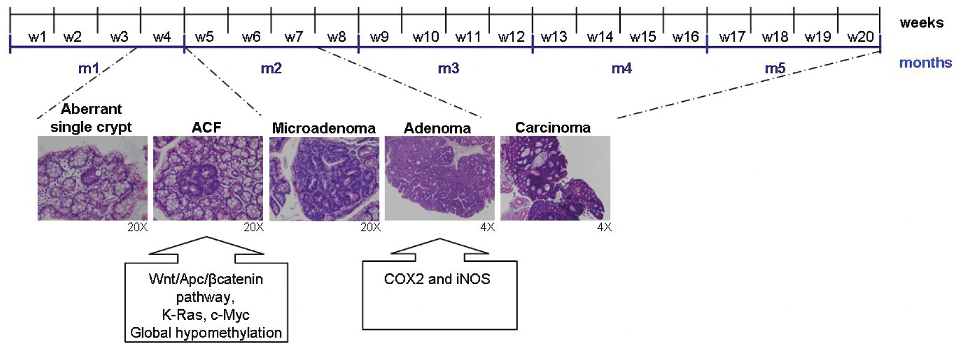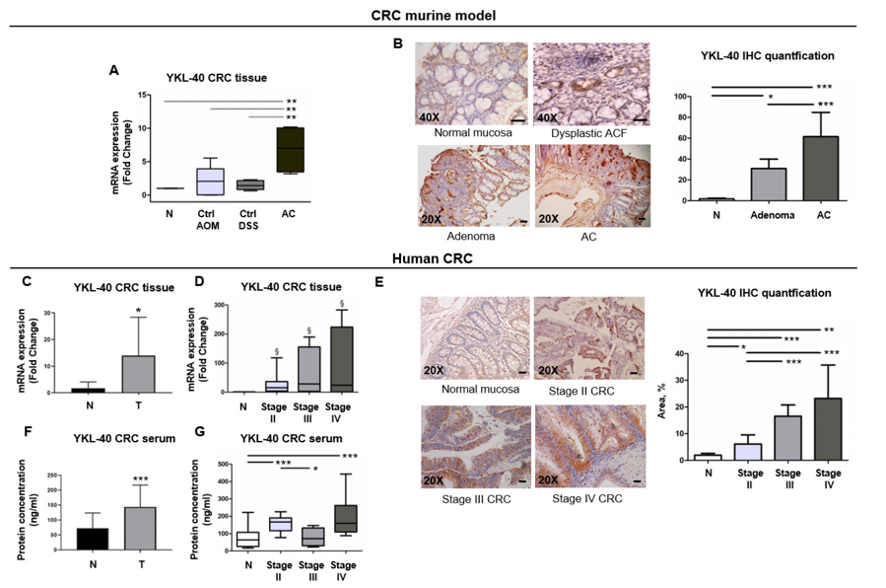Biomarkers as predictive molecules in colon cancer diagnosis, prognosis and therapy response; detection of metastatic phenotypes during colorectal carcinogenesis; response/resistance to therapies.
Colorectal cancer (CRC) is the third most common neoplastic disease worldwide and is the second leading cause of cancer death in the western world. It develops via a multistage process that involves the accumulation of genetic and epigenetic alterations. In humans, colon carcinogenesis is a long, chronic process that is thought to occur over 10 to 20 years. Experimental models that mimic the disease in rodents by chemical induction in less than a few months provide a means to understand the molecular alterations that arise in human CRC.
Development of cancer in AOM/DSS murine model closely mirrors the pattern seen in humans. Tumors induced in mice exposed to AOM/DSS treatment accurately recapitulate the pathogenesis observed in human CRC. Therefore, this model is considered a valuable platform in which perform gene profiling studies, for the recognition of new biomarkers, and identification of candidate genes to select for treating colon cancer disease. Furthermore, it can be employed in translational preventive and/or therapeutic protocols.

Schematic representation of multistep tumor progression in the AOM/DSS murine model. The multistep tumor progression observed in the AOM/DSS murine model of CRC, based on the ACF-adenoma-carcinoma sequence, is represented on the timeline, with the principal molecular alterations assessed in specific phases of the carcinogenic process. Journal of Carcinogenesis 2011, 10:9

YKL-40 is overexpressed in CRC mouse model and in human patients. It can be used as biomarker for differentiation of cancerous from normal mucosa. (A) qPCR analysis of YKL-40 mRNA levels in murine colon normal mucosa (N) (n = 5) and only-AOM- (Ctrl AOM) (n = 5) or only-DSS-treated (Ctrl DSS) (n = 5) mucosa and adenocarcinoma (AC) (n = 5). (B) IHC analysis of YKL-40 protein in murine dysplastic ACF,adenoma, and adenocarcinoma (AC) and its quantification. (C) qPCR analysis of YKL-40 mRNA levels in tumoral and matched non-tumoral tissues of CRC patient samples (n = 41) and (D) in samples stratified for CRC stages. (E) IHC analysis of YKL-40 protein in human colorectal tumoral and normal tissues and its quantification. (F) Measurement of YKL-40 protein levels both in normal individuals’ (n = 43) and in CRC patients’ (n = 43) sera and (G) in samples stratified for CRC stages. (A–G) Data are shown as mean SD. Statistically significant differences were calculated using Student’s t test: *** p < 0.0001; ** p < 0.001; * p < 0.01; § p = 0.1. (B,E) 20X and 40 X magnification. Scale bars, 50mm.
Cells 2022, 11, 3568

